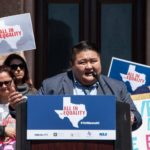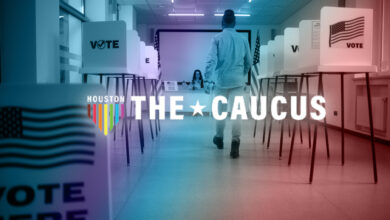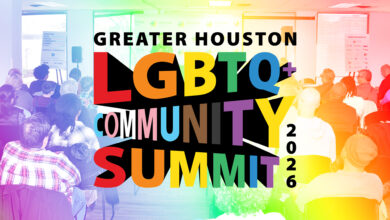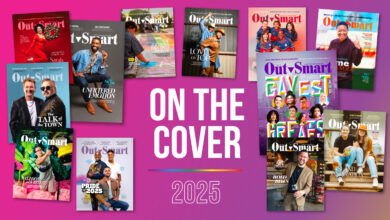
Local LGBTQ Organizations Raise Funds for Pandemic Relief
The Montrose Center, TENT, and SOSU have collected over $400,000 for vulnerable populations.

Disaster relief funds are much-needed lifelines for the LGBTQ community, especially during disasters when this already-vulnerable group must navigate recovery systems that overlook its unique needs, according to Kennedy “Kent” Loftin.

Loftin is the chief development officer of the Montrose Center, Houston’s largest LGBTQ resource center. The organization has partnered with two local transgender nonprofits—Transgender Education Network of Texas (TENT) and Saving Our Sisters United, INC (SOSU)—to provide both immediate and long-term assistance to clients who have been impacted by the COVID-19 pandemic.
“Larger disaster-response organizations are designed for heterosexual nuclear families and take a long time to set up, so a lot of LGBTQ community members fall through the cracks,” Loftin notes. This view is supported by the 2014 research article Queer Domicide: LGBT Displacement and Home Loss in Natural Disaster Impact, Response, and Recovery. “Over time, the Montrose Center and other LGBTQ-centered organizations are being pulled into disaster responses because there’s this great need in our community.”

The adversities the trans community disproportionately faces only worsen during catastrophes like Hurricane Harvey or COVID-19, according to a Facebook post by SOSU. “The trans community already struggles regularly with employment, lack of resources, lack of support, and lack of protection under normal circumstances. Therefore, we know undoubtedly [that] this demographic is especially vulnerable, specifically in regard to economic and health hardships.”
According to a 2015 survey conducted by the National Center for Transgender Equality (NCTE), trans people are more than twice as likely to live in poverty, compared to the U.S. population. Despite needing to, survey respondents also reported not going to the doctor at least once in 2014 due to cost.
The stakes are even higher for trans people of color, who, according to the same study, are up to three times as likely to live in poverty, compared to the U.S. population. The study also found that trans people of color and disabled trans folks were less likely than their white, able-bodied counterparts to have visited the doctor at least once in 2014.
So far, the Montrose Center has raised over $382,500 for COVID-19 relief. The funds provide the nonprofit’s clients with rent relief, gift cards, food, toiletries, and other basic items that can either be picked up curbside at the Center or delivered to a client’s home. Those who need assistance can apply for funds through the Montrose Center’s electronic client-intake forms.
TENT and SOSU have collectively distributed over $18,000 via gift cards and the Cash App—eliminating the burdensome paperwork and transportation barriers clients would have otherwise experienced. However, due to a large influx of applications, both nonprofits have temporarily closed their online relief programs until additional donations come in.
“SOSU is a small, grass-roots organization, so I don’t want to re-open the online relief forms and not give people enough,” says Atlantis Narcisse, the founder of SOSU, which so far has raised about $12,000. “I want to help lessen the financial strain of some of the needs they have.”

TENT’s executive director, Emmett Schilling, agrees. “We don’t want to over-promise help when there continues to be a greater need than funding available to disperse,” he says. The nonprofit, which has raised $6,500, plans to re-open its application process once it secures at least another $5,000. For more information, individuals can visit TENT’s website.
The Montrose Center’s disaster-relief efforts started in 2017 when Hurricane Harvey hit Houston. “Hurricane Harvey made it clear that there needs to be a quick and more coordinated response in the LGBTQ community, since recovery systems do not have significant regard for the vulnerabilities of the LGBTQ population and people living with HIV,” Loftin says.
The Center for Disaster Philanthropy (CDP) came to the same conclusion. According to the CDP, emergency or recovery services can frequently disrespect the LGBTQ community, preventing access to needed resources such as FEMA and Red Cross.
After government officials enforced quarantine restrictions to limit the spread of the COVID-19 disease, the Montrose Center and other LGBTQ organizations were again impacted due to the reduced number of fundraising events and programs. “Small fundraisers are important for us,” Loftin admits. “Tips from drag queens and benefit nights hosted by community members at local bars—those things add up. A significant portion of event programming provided by queer communities is not possible right now, and we’re feeling the loss.”
But the issues faced by the LGBTQ community extend well beyond disasters. “When you have a state legislature that’s hell-bent on pushing anti-trans and anti-LGBTQ legislation, it creates a culture and landscape where not only are people dealing with these physical threats and immediate needs, but also with bias, discrimination, harassment, and violence,” Schelling notes.
Although Schelling recognizes that the City of Houston could and should do better by the trans community and other marginalized groups through radical changes in its policies, he appreciates the city’s diversity and its commitment to community.
“In the most trying of times, Houston continues to show its big heart,” Schelling says. “Since I’ve been here, I’ve witnessed that heart firsthand in the wake of Hurricane Harvey and now in the midst of the COVID-19 pandemic. While I recognize we are not perfect and our city has a lot of work to do regarding implementing inclusive municipal policy, Houstonians continue to show that we are resilient, compassionate, and have endless love for this city we call home.”
Support TENT and SOSU by donating to their respective COVID-19 relief funds at bit.ly/2Z12VPi and bit.ly/2Z1EC3p. Help the Montrose Center by supporting its relief fund at bit.ly/35X2hn4 and donating cleaning supplies, protective gear for staff who conduct street HIV testing, bottled water in bulk, and non-perishable items for its food pantry.










